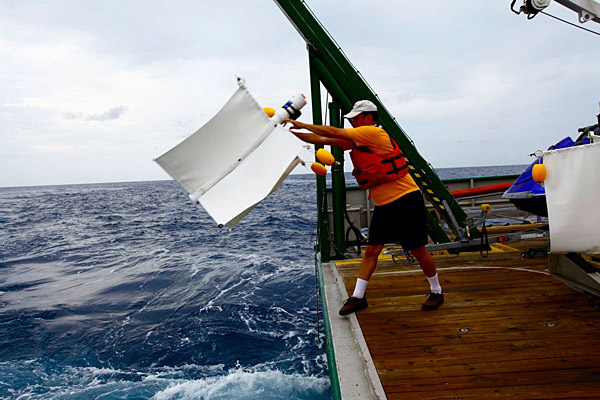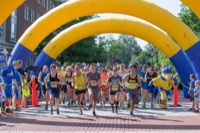
July 28: Science Cafe
Presentation to consider challenges of predicting motion in the ocean
1:39 p.m., July 8, 2014--The motion of the ocean creates a challenge for those who need to track oil spills, find downed aircraft, and locate other objects in the deep blue.
In fact, four years after the Deepwater Horizon oil spill, scientists continue to study the effects of that disaster to learn about the impact on the Gulf of Mexico, and gather data to improve spill detection, mitigation and clean-up in the event of another oil spill.
Events Stories
June 5: Blue Hen 5K
June 6-9: Food and culture series
A Science Café presentation, “Oil Spills, Airplanes, and Rubber Duckies: The Challenges of Predicting Motion in the Ocean,” will be held on Monday, July 28, from 5:30-7 p.m., at the Deer Park Tavern, 108 West Main Street, Newark.
Those who attend can enjoy free appetizers and engaging conversation in a fun and casual atmosphere.
University of Delaware scientists Bruce Lipphardt, Helga Huntley and Dennis Kirwan of the College of Earth, Ocean, and Environment will discuss their research and efforts to accurately predict the fate of oil and other substances in the ocean.
The three scientists are investigators in the Consortium for Advanced Research on the Transport of Hydrocarbon (oil) in the Environment (CARTHE). CARTHE is a research team led by the University of Miami Rosenstiel School of Marine and Atmospheric Science that includes 16 major universities, including the University of Delaware.
The consortium is dedicated to predicting the path of oil released into the environment as a result of future oil spills. Through the deployment of large-scale field experiments and complex computer modeling, the team is getting closer to accurately predicting the fate of these substances.
Those who plan to attend are asked to RSVP with their name and the number attending to Laura Bracken, 305-421-4228, l.bracken@miami.edu, or visit the Facebook event page.
About CARTHE
The Consortium for Advanced Research on the Transport of Hydrocarbon in the Environment (CARTHE) is a research team dedicated to predicting the fate of oil released into the environment to help inform and guide response teams, thereby protecting and minimizing damage to human health, the economy, and the environment.
CARTHE is part of the Gulf of Mexico Research Initiative (GoMRI), a 10-year independent research program established to study the effect, and the potential associated impact, of hydrocarbon releases on the environment and public health, as well as to develop improved spill mitigation, oil detection, characterization and remediation technologies.
An independent and academic 20-member Research Board makes the funding and research direction decisions to ensure the intellectual quality, effectiveness and academic independence of the GoMRI research. All research data, findings and publications will be made publicly available.
The program was established through a $500 million financial commitment from BP. For more information, visit this website.








